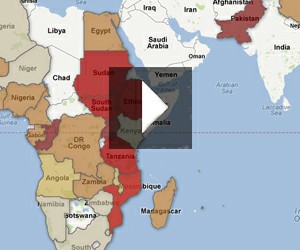Federal Water Tap, June 25: Sea Level Rise in the United States
Two reports from federal research agencies suggest that sea-level rise along the coastal United States will happen quicker and surge higher than the global average. Combined with storm surges and tidal fluctuations, higher seas increase the flood risk for billions of dollars of property, as well as vital infrastructure such as roads, power stations and wastewater treatment plants.
The U.S. Geological Survey found that sea levels along the Eastern Seaboard—from North Carolina’s Outer Banks to the shores north of Boston—have increased three- to four-times faster than the global average since 1990.
In a separate study, the National Research Council estimates that the waters off the central and southern California coast could rise 1 meter (3 feet) in the next century. Northern California, Oregon and Washington would see a smaller increase.
To get a bird’s-eye view of these effects, browse NOAA’s superb sea-level rise tool. Alabama, Florida, Georgia and Texas have been mapped. Other areas will be added throughout the next year.
Summer Reading
Congress’s research arm prepared a report on drought, which the Federation of American Scientists’ Secrecy News made public. The U.S. does not have a comprehensive drought policy and doing so would be difficult, according to the report, because of “split federal and non-federal responsibilities, the existing patchwork of federal drought programs, and differences in regional conditions and risks.”
Tribal Water Rights
The Navajo Nation and the Hopi Tribe are still debating the merits of a water rights settlement proposed by Arizona Sen. John Kyl. Indian Country Today reports that the Navajo Nation will hold two community meetings this week before deciding on June 27 whether to endorse the legislation that would set the tribe’s rights to the Little Colorado River and provide money for three groundwater supply projects.
Farm Bill
The Senate passed its version of the behemoth legislation known as the Farm Bill. The five-year, US$498 billion bill cut spending on food stamps and land conservation programs, while ending direct payments to farmers. Instead, farmers will receive money when commodity prices drop below a set baseline.
Now, the House of Representatives must act. But its members disagree about certain spending cuts, Reuters reports. The lower chamber will be working on a short schedule when it takes up debate on the bill in mid-July. The current version expires at the end of September.
California Water Storage
The House approved a bill that would increase water storage in the dams on California’s Merced River, but it would do so at the expense of the river’s “wild and scenic” status. The Fresno Bee reports that by allowing the Merced Irrigation District to raise parts of the New Exchequer Dam, the reservoir would at times extend into federally protected parts of the river. The bill now goes to the Senate.
Fracking Regulations
House Democrats called on the Obama administration to require companies using the hydraulic fracturing technique on federal lands to disclose the chemicals they use, both before and after drilling, Reuters reports. A group of 38 representatives urged more stringent regulations than the White House has proposed, which requires companies to reveal chemicals only after drilling is completed.
Committee Hearing
The House Committee on Natural Resources will hold a hearing on June 27 to discuss whether federal regulations are increasing the cost of hydroelectric power from non-federal projects.
Federal Water Tap is a weekly digest spotting trends in U.S. government water policy. To get more water news, follow Circle of Blue on Twitter and sign up for our newsletter.
Brett writes about agriculture, energy, infrastructure, and the politics and economics of water in the United States. He also writes the Federal Water Tap, Circle of Blue’s weekly digest of U.S. government water news. He is the winner of two Society of Environmental Journalists reporting awards, one of the top honors in American environmental journalism: first place for explanatory reporting for a series on septic system pollution in the United States(2016) and third place for beat reporting in a small market (2014). He received the Sierra Club’s Distinguished Service Award in 2018. Brett lives in Seattle, where he hikes the mountains and bakes pies. Contact Brett Walton





Leave a Reply
Want to join the discussion?Feel free to contribute!